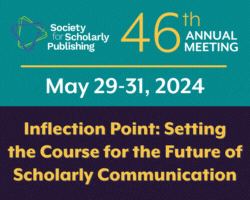SSP’s Washington DC local networking group is still young, but it’s mighty. Our second meeting ever was April 9, 2019 at the American Chemical Society building in downtown DC. It brought in about 50 attendees. For many of us, “Plan S fatigue” had set in, so we broadened our discussion to alternative funding models and how they will affect stakeholders in the scholarly publishing ecosystem. The DC local committee strived for increased interaction, so we banned presentation slides and placed a pile of cookies at each table.
Simon Beale, SVP, Global Sales and Partnership Development at Wiley, jump-started the roundtable discussions with a short talk on the progression of the open access (OA) movement and how we have found ourselves facing such a “shocking” plan. According to Simon, the beginning of the OA movement in publishing coincided with the advent of the Big Deal; this sort of action and reaction is similar to the impact of Plan S on societies and publishers today. One of the lesser talked-about effects is the increase in output (volume and pace) publishers will be impelled to support. Simon warns that as internal workflows change to keep up, it will become increasingly difficult to differentiate legitimate publishers from predatory ones. Plus, in the author-pays model, the researcher will more heavily bear the burden of both the producer and payer of the published content and subsidize the cost for consumers (readers). Not surprisingly, this will affect producer-heavy geographical regions differently from consumer-, or reader-, heavy ones and will make country or state-specific publishing deals more important. Moreover, fracturing these dealings is a less efficient, admin-heavy way for publishers to do business.
Many of us found the roundtable format very engaging and a great way to network. Although we had 7 tables and topics, conversations converged on a few main ideas:
- Increasing open science while maintaining revenue that in the end supports the continued production and publication of that science. And how do we limit the burden that the author-pays model places on researchers? This is where alternative funding models come up. We discussed nascent models such as Plan U (pre-prints), Plan T, and read-and-publish/publish-and-read deals. However, still in their experimental stages, they seemed to generate more questions than answers.
- Repurposing existing content and adding services around event content, scientific data, taxonomies, images, and more to capitalize on what we already have at our fingertips. There’s also opportunity here to seek out sponsorships to support these efforts in exchange for marketing.
- Increasing competition for funding dollars and how this might stress institutions and researchers from various geographical regions in different ways. For some, publication choices will be limited by how much money they can dedicate to publishing. Under-funded and developing countries will be disproportionately affected by author-pay models.
- As business practices adapt to an increase in OA, we will see a concomitant increase in products and services that administer new operational requirements. Collecting and interpreting data to track the past and anticipate the future also becomes more important in this atmosphere: publishers and researchers must understand where relevant funding is coming from and where it’s going in order to tap into these funding streams.
It wasn’t doom and gloom all around. Underlying much of our conversation was the acknowledgment that evolving political and cultural pressure can increase scientific progress and industry’s willingness to experiment, which ultimately benefits society and improves lives. Following the event, we cheered to this and our growing network of publishing professionals at nearby venue Bar-Cöde.
Event report written by Paige Wooden.



Join the Conversation
You must be logged in to post a comment.